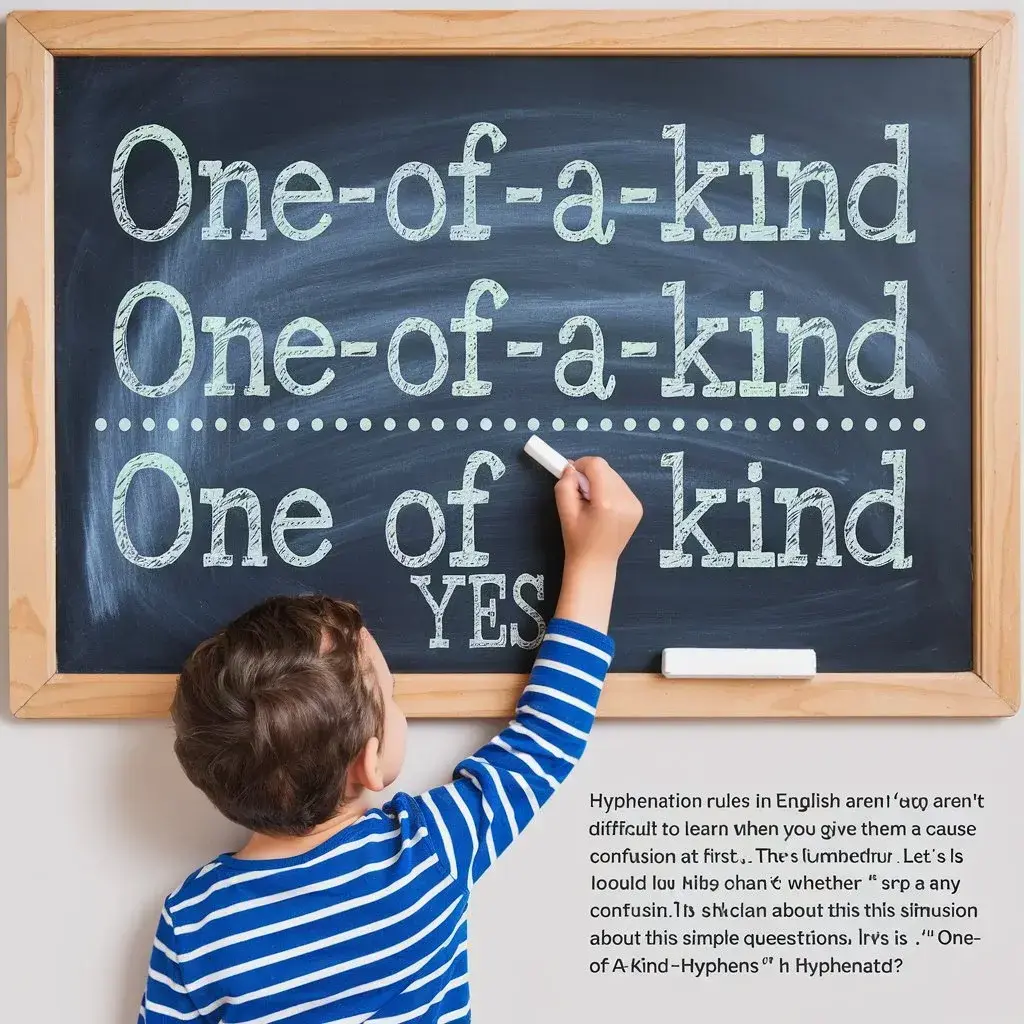Hyphenation rules in English aren’t difficult to learn when you give them a chance, but they may cause some confusion at first. Let’s look at whether we should use “one-of-a-kind” or “one of a kind” in sentences and clear up any confusion about this simple question: Is “one-of-a-kind” hyphenated?
One-Of-A-Kind Or One Of A Kind – Hyphenated Or Not?
“One-of-a-kind” should be hyphenated when you’re using it to modify a noun or object in a sentence. In this form, it becomes an adjective. On the other hand, “one of a kind” should remain unhyphenated when it is not modifying a noun but instead acting as its own phrase noun. You’ll often find “one of a kind” at the end of a clause, since no nouns or objects come after it.
Examples Of When To Use “One-Of-A-Kind”
We’ve established the basics of the one-of-a-kind hyphen rule, so now it’s time to go through some examples. We’ll start with the hyphenated variation, where we use it as an adjective. In each of these examples, you’ll notice we’re modifying a noun or object in the sentence. It’s also important to note that “one-of-a-kind” is the most popular spelling and is gradually phasing out the use of “one of a kind”.
Examples
- This is a one-of-a-kind opportunity.
- You are truly a one-of-a-kind kid.
- This is a one-of-a-kind wedding.
- I am a one-of-a-kind talent.
- He is a one-of-a-kind man.
- This is a one-of-a-kind experience.
- You have a one-of-a-kind gift.
- The one-of-a-kind painting sold for millions.
- It’s a one-of-a-kind watch with intricate details.
- She wore a one-of-a-kind dress to the event.
- This is a one-of-a-kind opportunity to grow.
- You created a one-of-a-kind artwork.
- They live in a one-of-a-kind house by the lake.
- He is a one-of-a-kind teacher with a unique style.
- That’s a one-of-a-kind recipe passed down for generations.
- Her one-of-a-kind personality lights up the room.
- This is a one-of-a-kind museum with rare artifacts.
- The one-of-a-kind performance received a standing ovation.
- This is a one-of-a-kind car built for speed.
- I met a one-of-a-kind individual at the conference.
Examples Of When To Use “One Of A Kind”
We leave “one of a kind” unhyphenated when we don’t use it to modify any nouns or objects in the sentence. It’s often placed at the end of a clause to reflect this. However, as mentioned earlier, the phrase “one of a kind” is becoming less popular, with most people preferring to use the hyphenated version even when it’s used as a noun phrase. For the sake of clarity, though, we’ll continue to follow the recommended AP style rules.
Examples
- You truly are one of a kind.
- This building is one of a kind.
- My mom is one of a kind.
- We are one of a kind.
- That dog is one of a kind.
- You are truly one of a kind.
- That sunset was one of a kind.
- My grandmother’s love is one of a kind.
- This sculpture is one of a kind.
- The bond we share is one of a kind.
- His approach to problem-solving is one of a kind.
- That dog’s personality is one of a kind.
- Her voice is one of a kind.
- This antique vase is one of a kind.
- The way he tells stories is one of a kind.
- Their hospitality is one of a kind.
- The view from this mountain is one of a kind.
- My mother’s cooking is one of a kind.
- The concert was one of a kind.
- Your creativity is truly one of a kind.
Is One-Of-A-Kind Hyphenated in AP Style?
If we briefly look at the AP style rules for hyphens, we’ll see that hyphens are considered “joiners” for closely linked words. We use hyphens to create one adjective from multiple words that add meaning for the reader. These hyphenated adjectives are then used as modifiers in a sentence. However, if there are no nouns or objects following the words, the phrase should be left unhyphenated.
Examples
- She wore a one-of-a-kind dress to the event.
- The artist created a one-of-a-kind painting for the gallery.
- His one-of-a-kind ideas revolutionized the industry.
- That one-of-a-kind experience changed my perspective.
- The museum displayed a one-of-a-kind artifact from ancient times.
- This is a one-of-a-kind opportunity you don’t want to miss.
- He has a one-of-a-kind personality that lights up the room.
- The chef prepared a one-of-a-kind dish for the competition.
- Her one-of-a-kind jewelry designs are highly sought after.
- The one-of-a-kind sunset took our breath away.
Should I Capitalize “Of A Kind” In “One-Of-A-Kind”?
Hyphenation rules are one thing, but adding capitalization rules introduces a whole new set of challenges. What happens when we want to write “one-of-a-kind” in a title? There are three main ways to handle capitalization, and each approach gives us a different answer. Let’s break them down:
- Capitalize only the first word and proper nouns: In this case, none of the words in “one-of-a-kind” are capitalized.
- Capitalize all words except for articles, short conjunctions, and short prepositions: Here, you’ll only capitalize “One” and leave “of-a-kind” uncapitalized.
- Capitalize all words in a title: In this case, all the words in “one-of-a-kind” will be capitalized, even though they technically count as one word.
Alternatives To “One-Of-A-Kind”
To avoid the hyphenation problem altogether, you can use some of these alternatives. They are single words, so they never need to be hyphenated and convey the same meaning as “one-of-a-kind”.
- Unique
- Distinctive
- Unequaled
- Rare
- Unparalleled
Quiz – One-Of-A-Kind Or One Of A Kind?
Now that we’ve covered the difference between one-of-a-kind and one of a kind, let’s test your understanding with a quiz. The answers are provided at the end.
- You are (A. one-of-a-kind / B. one of a kind).
- This is a (A. one-of-a-kind / B. one of a kind) offer.
- You won’t find a venue that’s this (A. one-of-a-kind / B. one of a kind).
- I’d like to have a (A. one-of-a-kind / B. one of a kind) celebration.
- We are all (A. one-of-a-kind / B. one of a kind).
Quiz Answers
- B
- A
- B
- A
- B
FAQs
Is “One-of-a-kind” hyphenated?
Yes, “one-of-a-kind” is always hyphenated when used as a compound adjective. The hyphens connect the words to clarify that they function together to modify a noun. For example, in the phrase “one-of-a-kind experience,” the entire expression describes the uniqueness of the experience. Without the hyphens, the meaning could become unclear. Hyphenating compound adjectives is important, especially in formal writing, to avoid ambiguity.
When should I use “One-of-a-kind”?
You should use “one-of-a-kind” before a noun to describe something that is unique or unmatched. It highlights that the object, person, or experience is like no other. For example, “She wore a one-of-a-kind dress” emphasizes that the dress is one of its kind, with no duplicates. It’s an ideal phrase to use when you want to convey rarity or exceptional uniqueness in a clear, descriptive way.
Can I use “One of a kind” without hyphens?
Yes, you can use “one of a kind” without hyphens when it is used as a noun phrase rather than a modifier. This occurs when you describe something after the main verb in a sentence. For instance, “His artwork is one of a kind” means that his artwork is unique, but since the phrase comes after the verb, no hyphens are needed. Both forms emphasize uniqueness, but only the adjective form (before a noun) needs hyphens.
Is “One-of-a-kind” formal or informal?
“One-of-a-kind” can be used in both formal and informal writing, but it generally carries a sense of elegance and importance. It is often used to describe something that is valuable, rare, or exceptional. Whether you’re writing a professional article or having a casual conversation, “one-of-a-kind” works well when you want to emphasize the uniqueness of something, making it suitable for a wide range of contexts.
What part of speech is “One-of-a-kind”?
“One-of-a-kind” is a compound adjective, meaning it is a group of words joined by hyphens that collectively act as a single descriptive word. It is used to modify nouns and tell the reader that the noun is unique. For example, in the sentence “He owns a one-of-a-kind car,” the phrase modifies “car,” indicating that there’s something particularly special or rare about it. Compound adjectives like this are common in English and help to make descriptions more precise.
Is “One-of-a-kind” AP Style approved?
Yes, according to AP Style guidelines, “one-of-a-kind” is correctly hyphenated as it is a compound modifier that precedes a noun. AP Style encourages hyphenating compound adjectives to avoid confusion and ensure clarity in writing. For example, in journalism or formal documents, writing “She gave a one-of-a-kind performance” follows the AP Style rule. Always hyphenate in cases where the phrase acts as a single unit of description for a noun.
Can I say “one of a kind” in a sentence?
Yes, “one of a kind” can be used as a descriptive phrase in a sentence, typically after a verb like is or was. For example, “This painting is one of a kind” conveys that the painting is unique, but since the phrase is used after the verb, hyphens are not necessary. It emphasizes the uniqueness of the subject without the need for additional adjectives. Use this form when you want to highlight individuality in a more relaxed or descriptive manner.
Is there a difference between “One-of-a-kind” and “One of a kind”?
Yes, there is a subtle but important difference between the two forms. “One-of-a-kind” is used as a compound adjective to modify a noun, while “one of a kind” is used as a predicate phrase after a verb. For example, “That is a one-of-a-kind car” uses the hyphenated version as an adjective, while “This car is one of a kind” uses the non-hyphenated phrase after the verb “is.” Both forms express uniqueness, but their grammatical usage differs depending on sentence structure.
Conclusion
In conclusion, understanding the difference between “one-of-a-kind” and “one of a kind” is crucial for clear and effective communication. The hyphenated form serves as a compound adjective to describe something unique before a noun, while the non-hyphenated form is used as a phrase after a verb. Both expressions highlight rarity or individuality, but their usage depends on sentence structure. By applying the correct form, you can ensure your writing is precise and professional.

I’m Clara Whitmore, the girl running the show at “Grammer Grove.” I’ve been playing with expressions and formats to make grammer a whole lot of fun. Over at Grammer grove, we’re here to make your English grammer incredible. Let’s add some professionalism and gratitude to yourwritting together!












